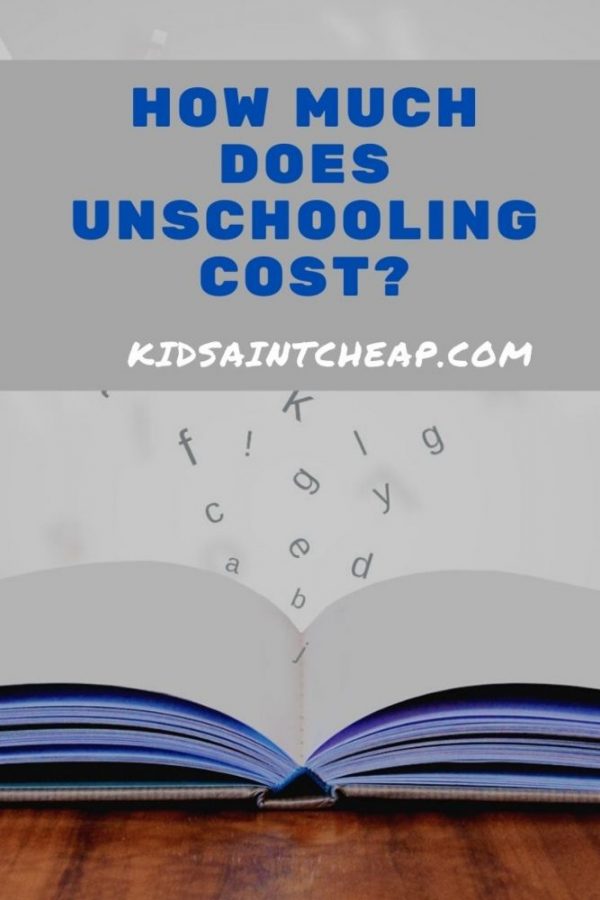Homeschooling can take many different forms, from essentially recreating school at home by using workbooks and taking multiple tests to a Charlotte Mason method where children derive their education largely through reading living books. There is also the Classical Education philosophy based on learning the classics like Greek and Roman history and language. However, perhaps the most misunderstood homeschool philosophy is unschooling. While detractors say unschooling isn’t really schooling at all, unschoolers see it as a viable educational form. If you’re interested in unschooling, you first must understand what the philosophy is and how much unschooling costs.
What Is Unschooling
Unschooling is an educational philosophy. Unschoolers don’t typically have their children take standardized tests or any other test. They don’t use textbooks or follow a set curriculum. Instead, the child determines what he would like to study based on his interests.
Cooking, gardening, and raising animals can all be part of the school day for an unschooler. Unschoolers also may code a robot, research the Titanic, do a science experiment, or record a new YouTube video all in the name of school. The idea is that unschoolers will learn more deeply because they’re working on things that interest them and that they choose to pursue. Hopefully, this helps the child become a lifelong learner.
However, critics argue that unschooling does not lead to a well-rounded education necessary for adult life. If an unschooler is not interested in math, she may not study it, which could cause problems in adulthood. Similarly, one who is interested in science may not study writing because she’s not particularly strong in that area.
How Much Does Unschooling Cost?
Unschooling costs can vary widely depending on the amount of money the parent has to dedicate to unschooling and the child’s interests.
Ways to Unschool for Free
If you don’t have much money to dedicate to unschooling, that’s okay! You can still give your child a stellar education. Consider these opportunities:
The Library
The library offers many educational items for your child from library books to movies to foreign language learning programs. In addition, most libraries offer regular learning programs such as wildlife experts who bring animals to the library or scientists who teach astronomy. Most libraries also offer activities like chess club and teen time that your child can join.
The Outdoors
One of the greatest classrooms is the great outdoors. Give your child ample time to hike and take nature walks. Some children enjoy keeping a nature journal. They can search for animals, observe the seasonal changes, watch birds. . .the possibilities are endless.
The Internet
There are some high-quality educational services on the Internet.
EdX
EdX offers free online college classes from 160 universities including Harvard, MIT, Boston University, and the University of California, Berkeley, to name a few. You can study architecture, math, literature, engineering, food and nutrition, and many more subjects with some of the greatest minds in the United States.
YouTube
If you think of YouTube as a place to waste time, think again. You can find tutorials and even educational lessons. My daughter and I are studying Japanese, in part through YouTube lessons that we find.
If You Have Money to Spend
If you have more money to spend on unschooling, you can take advantage of other academic resources.
Camps
Educational camps offer your child a unique way to learn. There are science camps, sports camps, liberal arts/reading camps. You can find what you need for your child if you have the money to pay for it.
Subscriptions
Likewise, you can also take advantage of subscription services to help your child in her educational endeavors.
Magazine Subscriptions
Magazine subscriptions from National Geographic to LEGO Magazine to Architectural Digest may feed your child’s desire to learn more about their current unschooling interests.
Box Subscriptions
Likewise, box subscriptions can also help spark your child’s creativity. Some of the most popular educational subscription boxes include Kiwi Crate for science and art, Atlas Crate for geography and culture, Tinker Crate for science and engineering, and Eureka Crate for engineering and design.
If your child is more creative, there are I Create Art boxes for budding artists. Young chefs may enjoy Eat2Explore cooking boxes.
For most interests a child can have, you can find a subscription box.
Tools & Learning Aids
If you have a budding scientist, and you can afford to buy a student microscope, your child can spend time creating slides and looking under the microscope.
You might buy a telescope for a child who is interested in astronomy or ample art supplies for a student who is interested in art.
A child who is interested in chemistry might benefit from a chemistry science kit. A history buff may want to take field trips to historic sites and museums to learn more.
If Money Is Available but Limited
Most of us aren’t independently wealthy. If you have some money to spend on your child’s education, but that money is limited, consider handing over control to your child. Let’s say you have $3,000 a year to spend on your child’s education. You can give your child $750 per quarter. Then, she can decide how to spend the money on her education each month.
If you feel comfortable letting her have this control, you are embracing the philosophy of unschooling as a child-lead schooling option. Plus, just letting her choose what to buy and deciding if the items were worth the money is an educational experience in itself. She’ll also learn how to budget the money. If she wants to attend an expensive camp in the summer, she’ll need to save the money from previous quarters to afford the camp.
Final Thoughts
Unschooling is a controversial form of homeschooling, but many unschoolers have gone on to be successful adults. If you opt for this form of homeschooling, know that unschooling costs as little or as much as you want it to.
Read More
What You Need to Know to Homeschool Your Child in the Age of Covid-19
How to Choose the Right Homeschooling Curriculum for Your Star Student
Where to Find Food If Your Children Are Going Hungry
What to Do if You Forgot to Cancel a Trial Subscription
Melissa is a writer and virtual assistant. She earned her Master’s from Southern Illinois University, and her Bachelor’s in English from the University of Michigan. When she’s not working, you can find her homeschooling her kids, reading a good book, or cooking. She resides in Arizona where she dislikes the summer heat but loves the natural beauty of the area.


